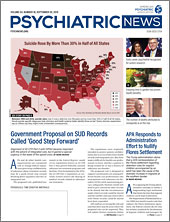Approximately 64% of psychiatrists eligible for board recertification in 2019-2021—or about 16,000 diplomates of the American Board of Psychiatry and Neurology (ABPN)—have agreed to participate this year in a pilot project of the ABPN testing an open-book assessment based on journal articles as an alternative to the proctored 10-year Maintenance of Certification (MOC) examination.
According to the ABPN, about 4,600 diplomates have already completed one or more of the examinations.
Christopher Thomas, M.D., psychiatry director for the ABPN, said that the pilot assessment is part of a continual effort to explore options for its MOC program and to make the test more accessible for psychiatrists.
“The ABPN pilot project guides the continued learning with at-home examinations on peer-selected articles on important clinical issues,” Thomas said. “This format fits more easily into busy schedules than traditional tests, and when important issues arise for clinicians, such as the opioid crisis, they can be addressed more quickly than in the current 10-year examination cycle.”
Eligible diplomates who choose to participate in this pilot program must read a minimum of 30 articles but no more than 40 articles and answer four out of five questions correctly on the first attempt on 30 journal article mini-exams.
Diplomates may choose from a library of articles that have been selected for the test by the ABPN pilot project test-writing committees. (These committees include nominated members from the ABPN, APA, the American Academy of Child and Adolescent Psychiatry, the American Academy of Neurology, and the Child Neurology Society.) Articles are accessed online through an ABPN portal, and diplomates may refer to the articles when answering questions. Once a mini-test is opened, diplomates must answer all questions to receive credit before they can access subsequent mini-tests. Articles and mini-tests can be completed in multiple sittings. In addition, diplomates must meet all other MOC requirements every three years to avoid being required to take the secure, proctored 10-year Part III exam. The project is running for three years (2019 to 2021), after which a decision will be made concerning whether to make it a permanent alternative to the 10-year MOC examination.
At least one diplomate who has taken the new exam format gives it a thumbs up. “The cognitive assessment exams at the end of the article were complemented by a genuine learning opportunity to get up to date on the latest literature,” said Daniel Steigerwalt, M.D., of the Central Texas Veterans Health Care System in Temple, Texas. “Articles were diverse and easy to access.”
Overall success of the pilot will be measured by a number of variables, Thomas said. These include the following:
•
Proportion of eligible diplomates who volunteer to participate.
•
Proportion of diplomates who complete the pilot.
•
Overall satisfaction of diplomates on the exit surveys.
•
Relevance and quality of the selected journal articles as indicated by the examination surveys.
•
Total test scores for each article and performance variation across articles.
•
Quality of the test questions as assessed by item statistics, number of corrected items, and examination surveys.
•
Feedback from professional societies.
“At the end of the pilot project, the ABPN will analyze these data and, if appropriate, request that the American Board of Medical Specialties [ABMS] approve the new format as a permanent replacement for the current MOC Part III examinations,” Thomas said.
Diplomates who received an invitation to enroll in the pilot may still participate. They should refer to the Part III Pilot section in their ABPN Physician Folios account.
Planning for an alternative to the proctored MOC test began in spring 2016, when the ABPN held a “Crucial Issues Forum” on MOC with attendees from major stakeholder organizations. In July 2017, the ABPN directors approved a pilot that consisted of short, online, open-book examinations based on journal articles for Part III MOC in psychiatry, neurology, child neurology, and child and adolescent psychiatry. In fall 2017, the pilot project was approved by the ABMS Committee on Continuing Certification.
APA CEO and Medical Director Saul Levin, M.D., M.P.A., said the new program “provides more flexibility in terms of diplomates being able to select articles that are relevant to their own practice. It allows diplomates to read the articles and complete the test at their own pace.” ■
Information about the ABPN pilot MOC test is posted
here.

